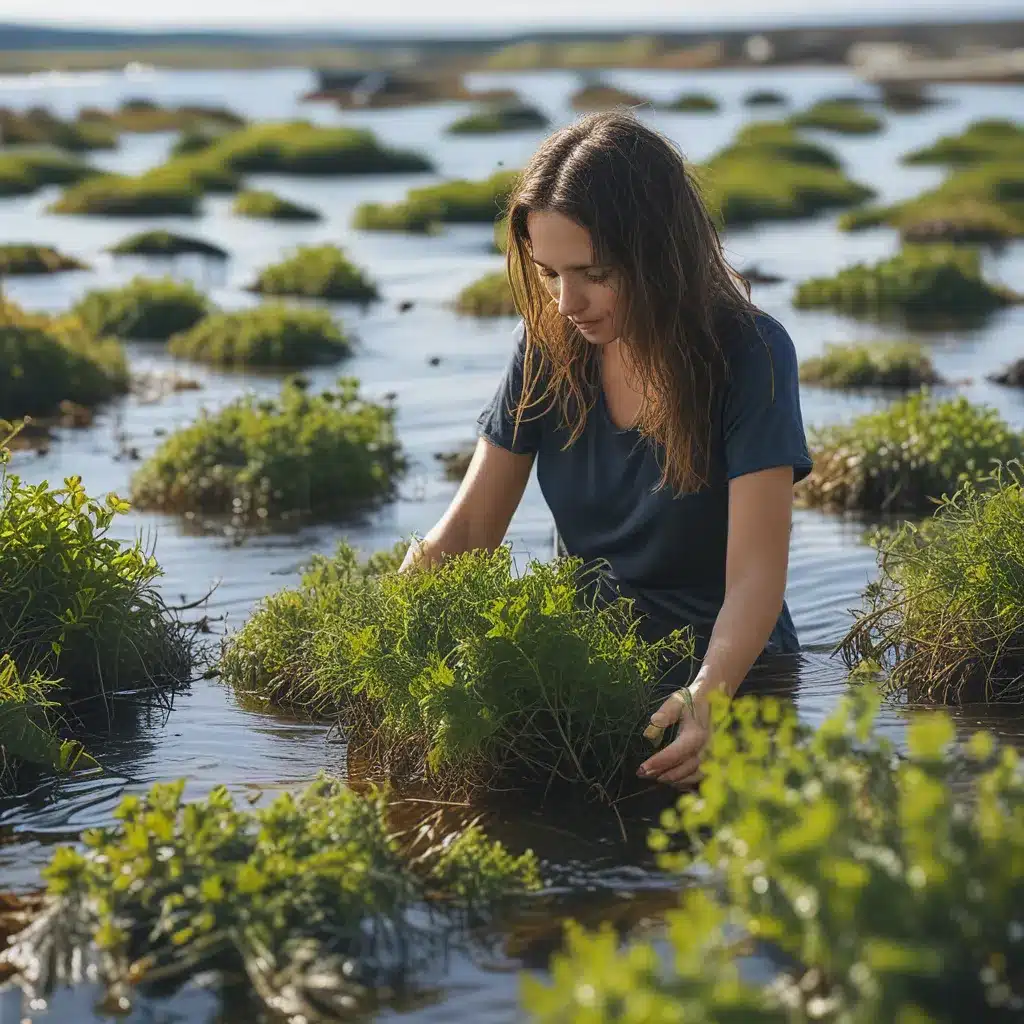
Diving into a Seaweed Revolution
As I step onto the lush, coastal farmlands of Thornapple CSA, the salty ocean breeze greets me with a whisper of possibility. This isn’t your average organic farm – it’s a testament to the power of innovation, where the secrets of the sea merge with the bounty of the earth. At the heart of this revolution lies an unlikely hero: seaweed.
Intrigued, I set out to uncover the untapped potential of this marine marvel, eager to understand how it’s transforming the future of organic agriculture. Join me as we dive beneath the surface and explore the Organic Oceans that are reshaping the way we grow, feed, and sustain our beloved CSA.
Cultivating a Seaweed Sanctuary
The team at Thornapple CSA is no stranger to the wonders of seaweed. They’ve been working closely with researchers from the University of Vermont, who have been awarded a $3.9 million grant from the USDA to study the impact of feeding seaweed to organic dairy cows.
“We’re thrilled to be part of this groundbreaking research,” enthuses Sarah, the farm’s operations manager. “Seaweed has the potential to revolutionize organic farming in ways we’ve only just begun to imagine.”
As we stroll through the verdant pastures, Sarah explains how the farm is dedicating a section of their land to cultivating a diverse array of seaweed species. “It’s like a underwater oasis, teeming with life and bursting with nutrients,” she says, her eyes sparkling with excitement. “We’re exploring how these marine plants can not only nourish our cows, but also enrich the soil and support the overall health of our ecosystem.”
Unraveling the Seaweed Superpowers
The research team’s findings have been nothing short of remarkable. They’ve discovered that seaweed can provide a wealth of benefits for organic dairy farmers, from reducing methane emissions to improving animal health and milk quality.
“Seaweed is a nutritional powerhouse,” explains Dr. Sabrina Greenwood, the project’s lead researcher. “It’s packed with essential vitamins, minerals, and even compounds that can enhance the cows’ digestive system and boost their immune response.”
But the real game-changer, according to Greenwood, is the impact seaweed can have on the cows’ methane emissions. “Cows are notorious for their greenhouse gas contributions, but incorporating seaweed into their diet has been shown to significantly reduce their methane output,” she says. “It’s a win-win for the environment and the farm’s overall sustainability.”
Nurturing the Soil, Nourishing the Herd
The benefits of seaweed, however, don’t stop at the cow’s dinner bowl. Research has also highlighted its potential as a natural fertilizer, capable of enriching the soil and supporting the growth of nutrient-dense crops.
“We’ve noticed a remarkable difference in our pasture productivity since we started incorporating seaweed into our soil management practices,” Sarah shares, as we stroll past lush, verdant fields. “The plants are more vibrant, the soil is more fertile, and our yields have been consistently higher.”
But the true magic happens when the cycle is complete. As the cows graze on the seaweed-enriched pastures, their nutrient-rich manure is then returned to the soil, creating a sustainable, closed-loop system. “It’s like a well-orchestrated dance between the land, the sea, and the animals,” Sarah muses, “each element playing a vital role in the overall health and resilience of our farm.”
Strengthening the Local Supply Chain
The partnership between Thornapple CSA and the research team extends beyond the farm’s boundaries, tapping into the potential of the region’s burgeoning seaweed industry. By collaborating with local aquaculture producers, the team is exploring ways to create a more resilient and localized supply chain for organic dairy farmers.
“Cultivating seaweed for feed has the potential to expand the aquaculture industry in the Northeast, which is home to 40% of the nation’s organic dairies,” explains David Conner, an economist on the research team. “This not only strengthens the local economy, but also improves supply chain efficiencies and reduces the environmental footprint of transporting feed over long distances.”
As I listen to Conner outline the project’s vision, I can’t help but feel a sense of excitement for the future of organic farming. “By integrating seaweed into the dairy supply chain, we’re not just improving the financial viability of our farms,” he says. “We’re also building a more sustainable, community-driven food system that benefits everyone – from the farmers to the consumers.”
Unlocking the Seaweed Potential
Back at the Thornapple CSA, as I watch the cows contentedly grazing on the seaweed-infused pastures, I can’t help but feel a sense of awe and wonder. This isn’t just a farm – it’s a living, breathing ecosystem where the secrets of the sea and the bounty of the land come together in perfect harmony.
“We’re just scratching the surface of what seaweed can do for organic farming,” Sarah tells me, her gaze fixed on the horizon. “But with the support of dedicated researchers and the commitment of our community, I have no doubt that the Organic Oceans will continue to transform the way we grow, nourish, and sustain our beloved CSA.”
As I bid farewell to Thornapple CSA and the seaweed sanctuary within, I can’t help but feel inspired. The future of organic farming is indeed blue, and the possibilities are as endless as the vast, untamed seas. Who knows what other wonders the Organic Oceans have in store?



